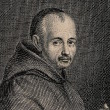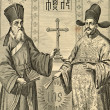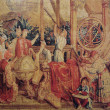Marin Mersenne: A Priest at the Heart of the Scientific Revolution
by Andrew Kassebaum
Filed under Christianity and Science

In late 1644, the Minim friar Marin Mersenne (1588-1648) travelled to Florence and assisted Evangelista Torricelli (1608-1647) in repeating his famous barometric experiment. When Mersenne returned to France, he shared Torricelli’s discovery with his network of correspondents, “giving rise to flourishing experimental and theoretical activities,”1 including the famous work on the weight of air conducted by Blaise Pascal (1623-1662). This is one of many contributions Mersenne would make to the... Read More
Scientific Geniuses and Their Jesuit Collaborators
by Andrew Kassebaum
Filed under Christianity and Science

Herbert Butterfield, the influential twentieth-century historian, identified the Scientific Revolution as “one of the great episodes in human history,” which, along with the rise of the empires of Alexander the Great and ancient Rome, deserves a place “amongst the epic adventures that have helped to make the human race what it is.”1 Numerous Catholic scientists, both laymen and churchmen alike, made valuable contributions to science before, during, and after the Scientific Revolution. The... Read More
How Catholic Missionaries Brought Science to China
by Andrew Kassebaum
Filed under Christianity and Science

In late December 1668, in a contest held at the Chinese Bureau of Astronomy, the Jesuit Ferdinand Verbiest (1623-1688) correctly predicted the length of a shadow cast by a vertical rod. The Kangxi Emperor was impressed. But he challenged Verbiest to two additional tests: the prediction of the exact position of the sun and planets on a given day and the timing of an approaching lunar eclipse. Verbiest successfully completed the final two tests, and, in the process, showed that the Chinese had much... Read More







